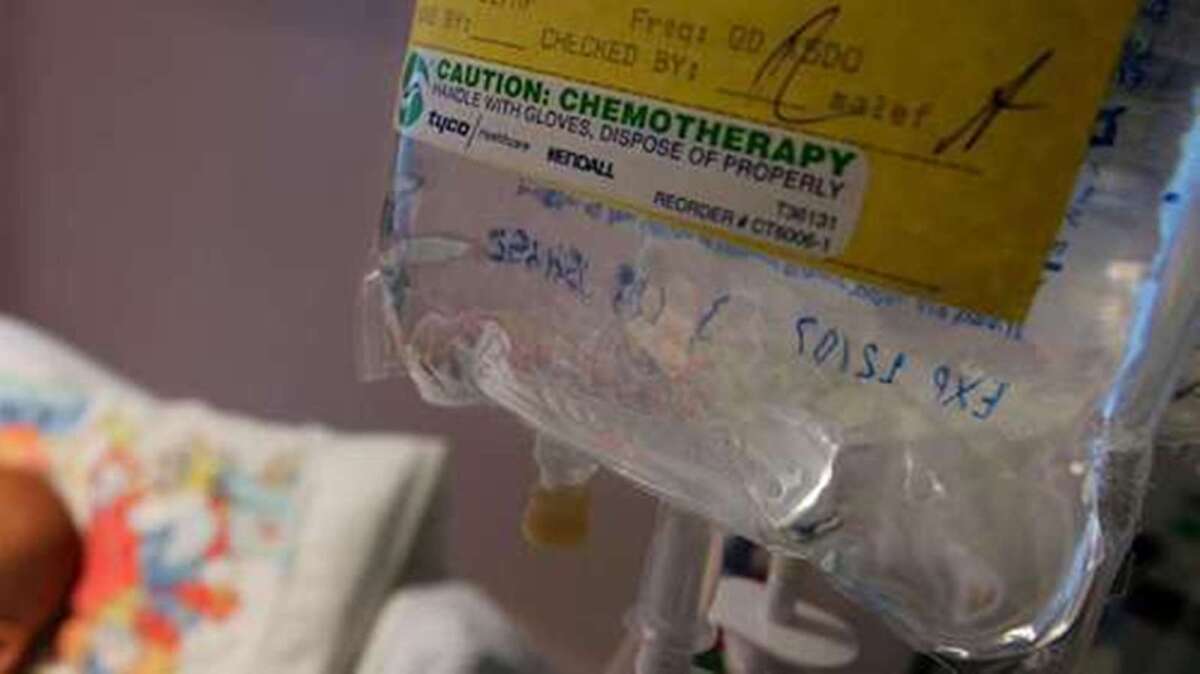‘Liquid biopsy’ picks up cancer biomarkers in blood, study finds

A cancer patient undergoes therapy in San Francisco.
- Share via
A blood test known as a “liquid biopsy” could help doctors track a shifty type of lung cancer without the need for invasive procedures, an international team of researchers says.
The findings, presented at the American Assn. for Cancer Research meeting taking place in Philadelphia, could help doctors predict whether patients with non-small cell lung cancer will respond to treatment with the drug crizotinib. The results also lend further support to the idea that, in many cases, non-invasive blood tests may be able to detect cancer biomarkers as effectively as traditional biopsies.
Non-small cell lung cancers make up about 85% to 90% of lung cancers, according to the American Cancer Society, and crizotinib is a common treatment for some types. But sometimes, even though the drug works well in the beginning, the patient eventually relapses.
“One of those subgroups harbors a rearranged EML4-ALK fusion gene that makes them responsive to crizotinib treatment,” the authors write, “but therapy resistance often soon occurs.”
One way to track whether the cancer is responding to treatment or growing resistant is to take tissue samples and analyze them – which is called a biopsy – but that’s a highly invasive procedure that can’t reasonably be done so frequently.
“Real-time monitoring of rearrangement status over the course of treatment will help identify patients showing therapy resistance, but monitoring through serial tumor biopsies has been an obstacle,” the authors wrote. “Therefore, new blood-based ‘liquid biopsy’ platforms need to be developed [for] monitoring biomarkers in the circulation.”
The scientists wanted to see if a simple blood test would help them predict a cancer’s response to treatment without having to perform such invasive procedures. They analyzed blood samples from 77 patients with non-small cell lung cancer whose mutation status was well known; of those patients, 38 had tumors with what’s known as an EML4-ALK fusion gene rearrangement.
The liquid biopsy procedure was able to identify 65% of the patients who had one of these rearrangements. Scientists found that in the 29 patients that received crizotinib, those with a positive EML4-ALK blood test had a progression-free survival time of 3.7 months; those with negative results had a 16-month survival time, more than four times as long.
“We showed that if we detected EML4-ALK in the platelet fraction before therapy starts and it does not disappear during treatment, it indicates that the patient is not responding to the therapy, which is associated with a shorter time to recurrence and, therefore, other therapies could be tried,” lead author Jonas Nilsson of Umeå University in Sweden said in a statement.
The researchers also followed a patient for 2.5 years and found that they could detect EML4-ALK in the liquid biopsy a good two months before it was possible to use radiography to confirm the disease.
The findings could give doctors a better idea of whether to keep using a treatment on a given patient – or whether it’s time to switch to something else more effective, the study authors said.
The study is part of a wave of research that has found that liquid biopsies might be an effective tool to closely monitor cancers where the treatment may go south fast. A Lancet Oncology paper this month studied 126 patients and found that tracking the biomarkers in their blood “identifies patients at risk of recurrence before clinical evidence of disease in most patients,” they wrote.
In a commentary on the Lancet Oncology paper titled, “Large B-cell lymphoma: Is the future written in the blood?” two researchers pointed out the potential advantages in some blood-based tumors.
“Molecular monitoring of disease with PCR-based strategies is more sensitive than conventional radiological imaging to assess the depth of treatment response, detect minimal residual disease, and identify patients at increased risk of relapse,” the researchers wrote.
Follow @aminawrite for more science news.







